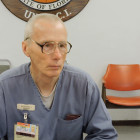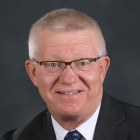
Giving Inmates with Life Sentences 2nd Chance Is Right Thing to Do
|
I went to prison as a child and was expected to die there.
Juvenile Justice Information Exchange (https://jjie.org/page/188/)

In late September, Torri was driving down the highway with her 11-year-old son Junior in the back seat when her phone started ringing.
It was the Hamilton County Sheriff’s deputy who worked at Junior’s middle school in Chattanooga, Tennessee. Deputy Arthur Richardson asked Torri where she was. She told him she was on the way to a family birthday dinner at LongHorn Steakhouse.
“He said, ‘Is Junior with you?’” Torri recalled.
Earlier that day, Junior had been accused by other students of making a threat against the school. When Torri had come to pick him up, she’d spoken with Richardson and with administrators, who’d told her he was allowed to return to class the next day. The principal had said she would carry out an investigation then. ProPublica and WPLN are using a nickname for Junior and not including Torri’s last name at the family’s request, to prevent him from being identifiable.
When Richardson called her in the car, Torri immediately felt uneasy. He didn’t say much before hanging up, and she thought about turning around to go home. But she kept driving. When they walked into the restaurant, Torri watched as Junior happily greeted his family.
Soon her phone rang again. It was the deputy. He said he was outside in the strip mall’s parking lot and needed to talk to Junior. Torri called Junior’s stepdad, Kevin Boyer, for extra support, putting him on speaker as she went outside to talk to Richardson. She left Junior with the family, wanting to protect her son for as long as she could ...

I went to prison as a child and was expected to die there.

Luis Zepeda, 19, has gone to juvenile camp three times. His most recent release was after Los Angeles began a new re-entry program designed to steer youths to resources.
“I didn’t get no resources,” Zepeda said. “It was always punish, punish, punish, punish.”

From their own experiences, young adults in recovery share what we should — and shouldn't say — to young people who may be using drugs or alcohol. "One of the worst things you can do is add anxiety to that situation... pass judgement..." This video is part of a series about substance use disorder among youth — and how we can help prevent or treat it when it occurs.

In 1642, Thomas Granger, 16, was hanged in Plymouth Colony, Massachusetts, for having sex with a mare, a cow and some goats. It was America’s first documented execution of a child offender and the debut of the juvenile death penalty. The practice would end 363 years later after the deaths of at least 366 child offenders — people under the age of 18 at the time of their crime.

In 1987, when I first interviewed James Morgan, he was on death row in Florida, sentenced to die in the electric chair for murdering a widow in a small town north of Palm Beach. He killed her when he was 16 years old. Prosecutors argue that teens can never change. How anyone could predict the future that way was a mystery to the American Psychological Association, the American Bar Association, and others. For years I wondered how the death row teens had grown up. If Morgan could transform himself even in a small way, it could prove prosecutors wrong, I imagined. But I knew I couldn’t gauge his progress unless I could meet him decades in the future.

The school-to-prison pipeline is one of our nation’s most pressing challenges, that all of us must help reverse. Not only do these outcomes ruin the lives of youth and their families, but they are also bad for our nation. There are affirmative steps that the American Bar Association is well positioned to take to help reverse these negative trends.

At a time when communities across the country are interested in evidence-based youth programming, an April conference will bring together leaders from the field to discuss what’s possible.

Presidential politics is in full swing and while the number of candidates is being reduced, those remaining are still in the platitudes stage. You know how it goes: Each speaker states his or her faith in America, the strength and world leadership of the United States, the need to right the wrongs of past politicians, that progress must be made and that only “Change!” can save our future.